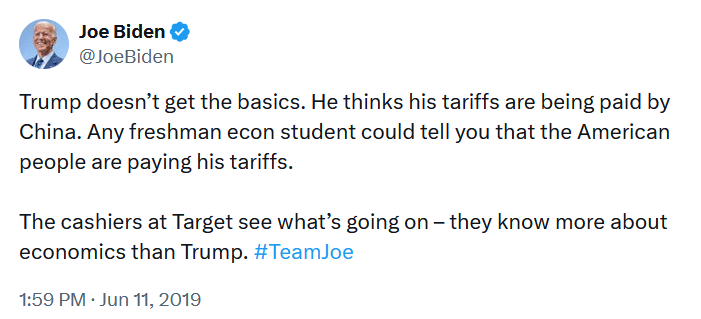I’ve blogged before about Ezra Klein’s abundance agenda. To recap: Ezra Klein asks the following questions:
- Why are so many people moving out of blue states and into red states?
- Why do red states grow faster than blue states?
- Why do blue states have so many problems with homelessness?
- Why can’t blue states build train lines and green infrastructure on time and on budget?
Klein concludes that liberals being maligned as “bad on the economy,” is not entirely unfair, and that Blue State policies have in many cases reduced growth and made people’s lives materially worse off. A fixation on bureaucracy is a hamstring to business. For liberals to win, Ezra wants them to not just be “not as bad” as conservatives, but he wants them to embrace a pro-growth mindset and pro-growth policies. These policies would deliver more energy, more housing, and more jobs without ever-increasing government expenditures.
I feel I can conclusively say that Klein has lost the argument, at least in online left-leaning circles. Instead, Bernie Sanders and the anti-growth crowd are winning people over to the idea that we need to *further* restrict businesses, further increase government bureaucracy, and thereby further reduce growth.
Bernie doesn’t want to fix electricity prices by improving generation and transmission like Klein does, he wants a moratorium on building datacenters.
Bernie doesn’t want to fix housing by allowing private companies to build more of it like Klein does, he wants to prevent companies from buying houses.
Bernie doesn’t want to grow the economic pie like Klein does, he wants to shrink and reslice it.
But Bernie wouldn’t have a microphone if people weren’t willing to listen to him, and in online left-leaning circles, Bernie is listened to, not Klein.
I think it’s because fundementally, people are reactionary in their own backyards. It’s all well and good to say we should encourage economic growth. But new businesses compete with old residents for land, water, and electricity. And so old residents complain that new businesses push up prices, and demand that new businesses be stopped completely. This pattern is universal and as old as civilization itself. But the modern American left is now overwhelmingly urban, and urban areas are where new businesses want to build, so the American left is now overwhelmingly anti-business.
I just want to rattle off a few arguments I’ve seen online about building, why these arguments don’t hold water, and why I think Klein will not manage to bring his Abundance Agenda into prominence.
Bernie has recently called for a moratorium on new datacenters, to protect consumers from increased electricity prices. I’ve seen a lot of the online left that considers itself “pro-growth” defend this, on the principle that:
- “Data centers produce economic growth, but not for the people who pay the higher electricity prices.”
Because data centers are “different,” it’s Good to ban new ones, it’s not anti-growth at all it’s just anti-“bad”-growth. To which I’d say:
- “________ produce economic growth, but not for the people who pay the higher electricity prices.”
Insert factories, electric trains, mass transit, a new University campus, or literally *anything else* and this argument is the same. This isn’t an argument against data centers, it’s an argument against any economic growth whatsoever. When things change there will always be winners and losers. When economies grow, some individuals don’t get the full benefit of that growth. But the idea of the Abundance Agenda was that the losers need to suck it up for the greater good, the price of your house isn’t worth blocking new housing and increasing the homeless rate of the wider city.
When it’s “other people” blocking housing and causing problems, it’s easy to demonize them and say they’re small-minded, wrong-headed, etc. But suddenly when it’s your back yard, and its your electricity bill, then the same people who demonized NIMBYs become NIMBYs themselves.
Of course it’s different, because THOSE OTHER people didn’t have reasonable concerns, they were motivated solely by greed and stupidity. WE however are smart and reasonable, all our concerns are well-thought out. This is how everyone thinks, but a lot of online liberal spaces are incredibly insular, and so don’t realize that their “reasonable” complaints are nothing new, but are just part and parcel of the NIMBY handbook going back decades.
If you say that new homes aren’t needed, and developers are just greedy, then there’s a reasonable amount of the online left who will dogpile you for your stupidity. New homes ARE needed, homelessness proves that there aren’t enough homes for everyone. Building new homes reduces home prices and increasing housing.
But if you say data centers aren’t needed, suddenly you’re on the 60 side of a 60/40 issue. A minority of the online left has no issue with data centers. But there are enough anti-AI people, anti-Silicon Valley people, anti-everyone rich (which therefor means anti-AI because rich people own and are the face of AI companies), and just plain closeted NIMBYs that being against new data centers is a “reasonable” belief in these spaces, where being against new housing wouldn’t be.
A few years ago, Silicon Valley and techies in general were seen as a staunch bastion of liberalism, proof that LIBERALS were actually the economically smart ones and not conservatives. A single election was all it took to change that, with a few techies siding with Trump, and with others not being sufficiently *anti*-Trump, the Tech sector has lost its shine and is now placed by many liberals in the same bin as the steel sector, the automotive sector, or even the oil and gas sector. These are just “bad people” who make money by making the world worse. So if they want AI, some people will reflexively oppose them, and supporting AI comes at a social cost in these spaces, even if you strenuously state how much you oppose the techies and the wider Silicon Valley elite.
With this shift, Silicon Valley can now be railed against in liberal spaces in just the same way as Ford or US Steel. These idiots want to build a new thing? It won’t bring any real jobs, it will dirty up our town, it will raise our prices, and they’re just making money by being evil anyway.
So blocking any new silicon valley thing becomes a socially defensible position, where 4 years ago it wasn’t. This is how coalition politics shake out on a local scale, people don’t weigh up the real-world costs and benefits of a position, they weigh up the *social costs* and the *social benefits* of a position. Supporting AI carries a social cost, opposing it carries a social benefit. That decides how the coalition reacts to AI much more strongly that the real-world economics of the situation.
Because simply put, a data center moratorium is a dumb as a factory moratorium. I, personally, won’t be enriched by a new factory being built. And most modern factories are so automated that they provide vanishingly few direct jobs, they aren’t the assembly lines with workmen that people think about, they’re honestly about as automated as a data center these days.
But my area will benefit from the increased investment, prices will go down as supply of goods increases, and I think other people should be allowed to make money by investing just as I’d like to be allowed to make money by investing myself. I wouldn’t want my dream restaurant to be blocked by NIMBYs who don’t want me bringing traffic to their part of town, so I don’t think it’s right to block other people’s economic activities even though a new data center will bring more electricity demand to me.
Some try to argue that data centers don’t produce anything real, that all AI is a bubble. That still isn’t a reason to block data centers. YOU DO NOT KNOW how the AI race will shake out, nobody does. The point of capitalism is that everyone makes their bets, and we find out later who won. If you want to bet against AI, short NVIDIA, or short Microsoft, Google, and Meta. You can bet against them and make money if you’re right, but you don’t know you’re right, and if the AI boosters are right and you block them from building datacenters, you’re impoverishing us all just like when you block housing, or a new factory, or a new University campus. You’re reducing economic growth because you think you know better but won’t put your money where your mouth is by shorting the stock, instead taking the easy way of blocking the business.
But this has been a rambly post about my opinions. The point is that these are the arguments I’ve seen all over left-leaning online spaces. The arguments are overwhelmingly anti-capitalist, anti-business, and anti-growth. Any sector that is not seen as explicitly left-leaning becomes a socially acceptable target for attack and NIMBY policies. This is antithetical to Klein’s abundance agenda. This is why I thought his agenda would not win in the left-of-center mind space, and I’m even more confident of that prediction now.
Coalitions aren’t build by reasoned argument, they are build by the social costs and benefits of holding a specific position. Techies have been etched with the scarlet letter (T for Trump, natch), and so opposing anything and everything they do has a social cost in left-of-center spaces, regardless of the reasoned arguments that growth is good for the people’s prosperity. Basically all businesses are etched with the scarlet C for conservative, and so opposing business is generally in vogue as well. Klein’s agenda relies on allowing businesses to get their way, to improve all our lives by letting business do business. That isn’t going to fly in the modern left, and I doubt Klein can change it.



